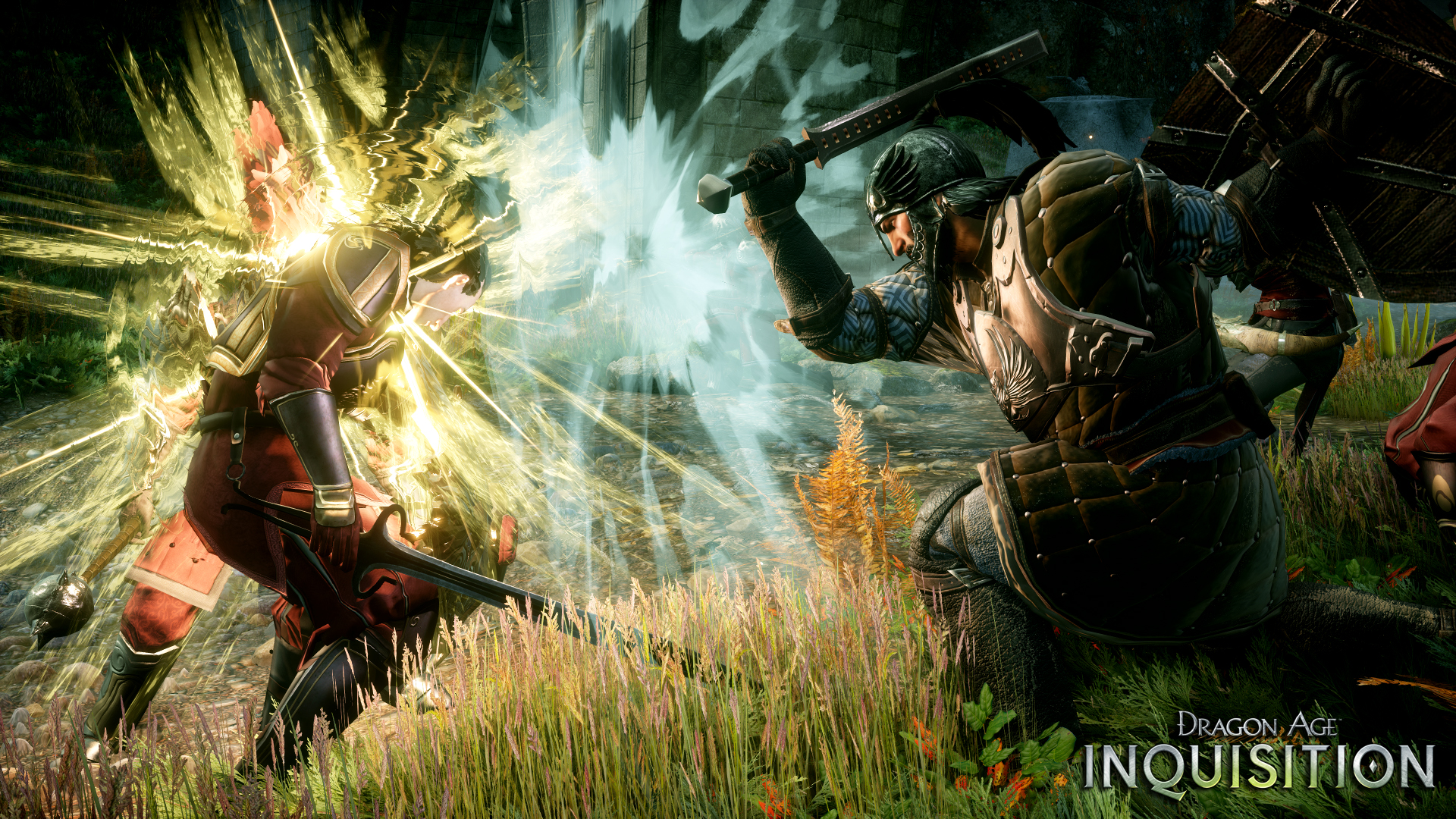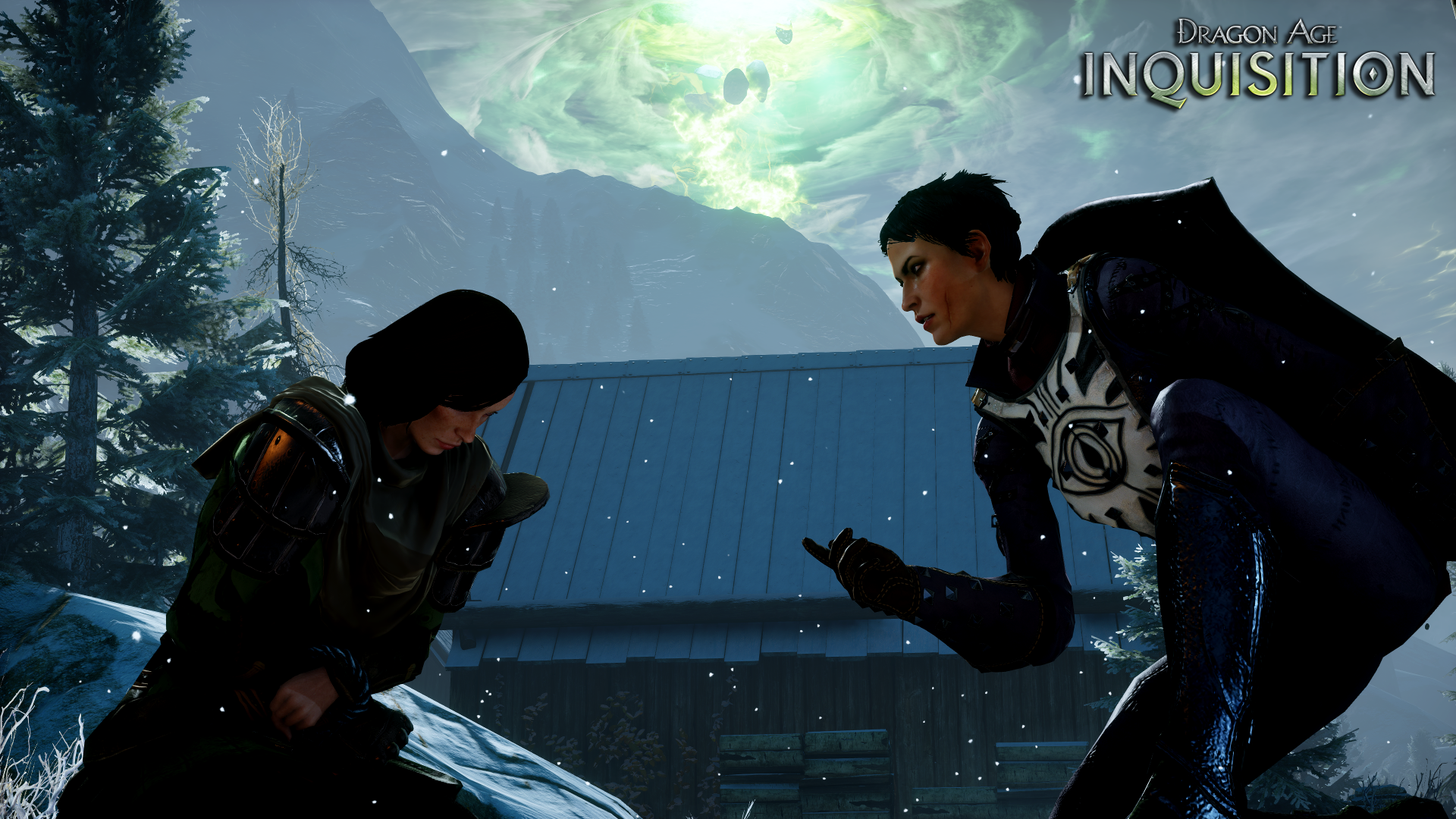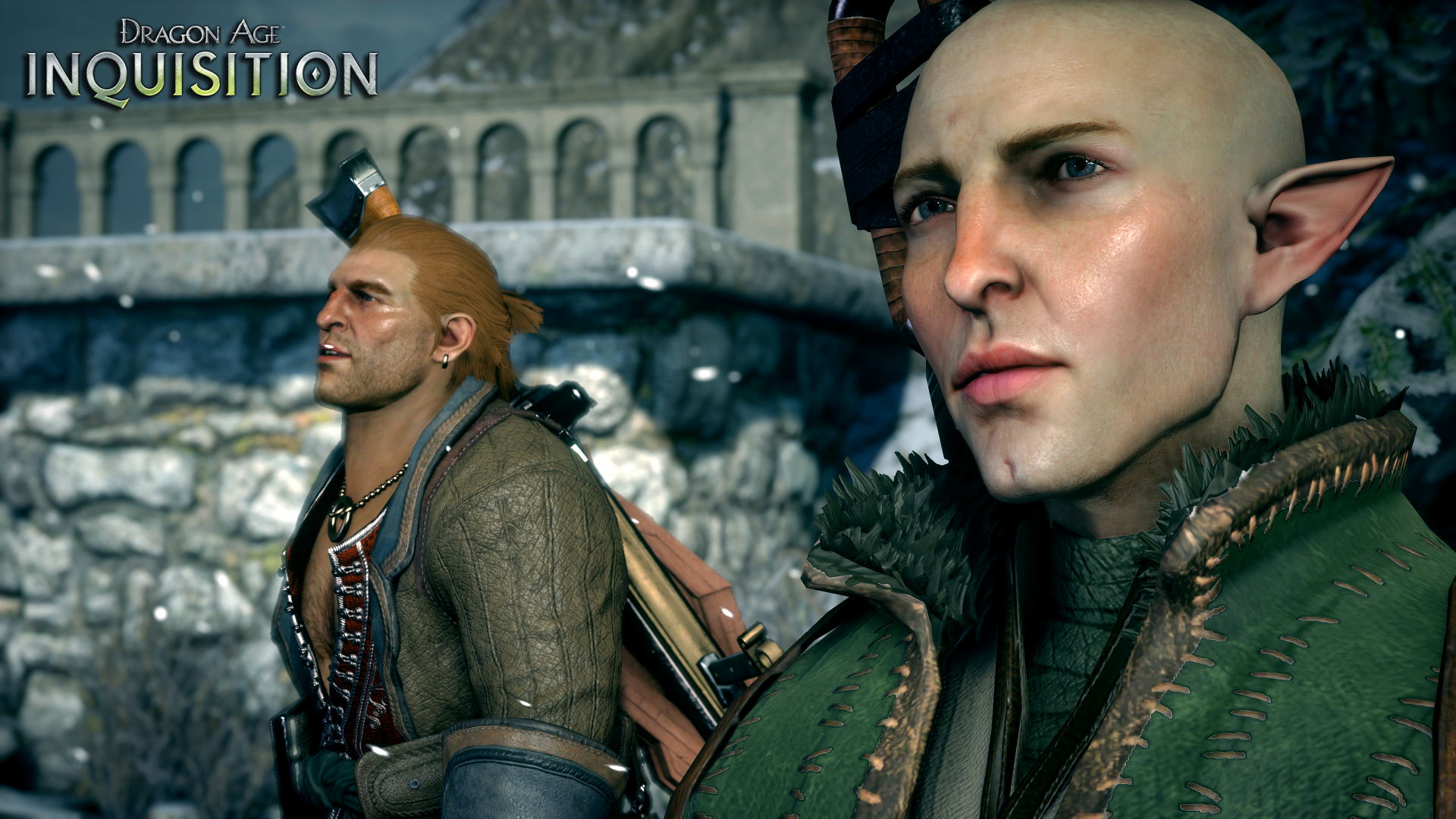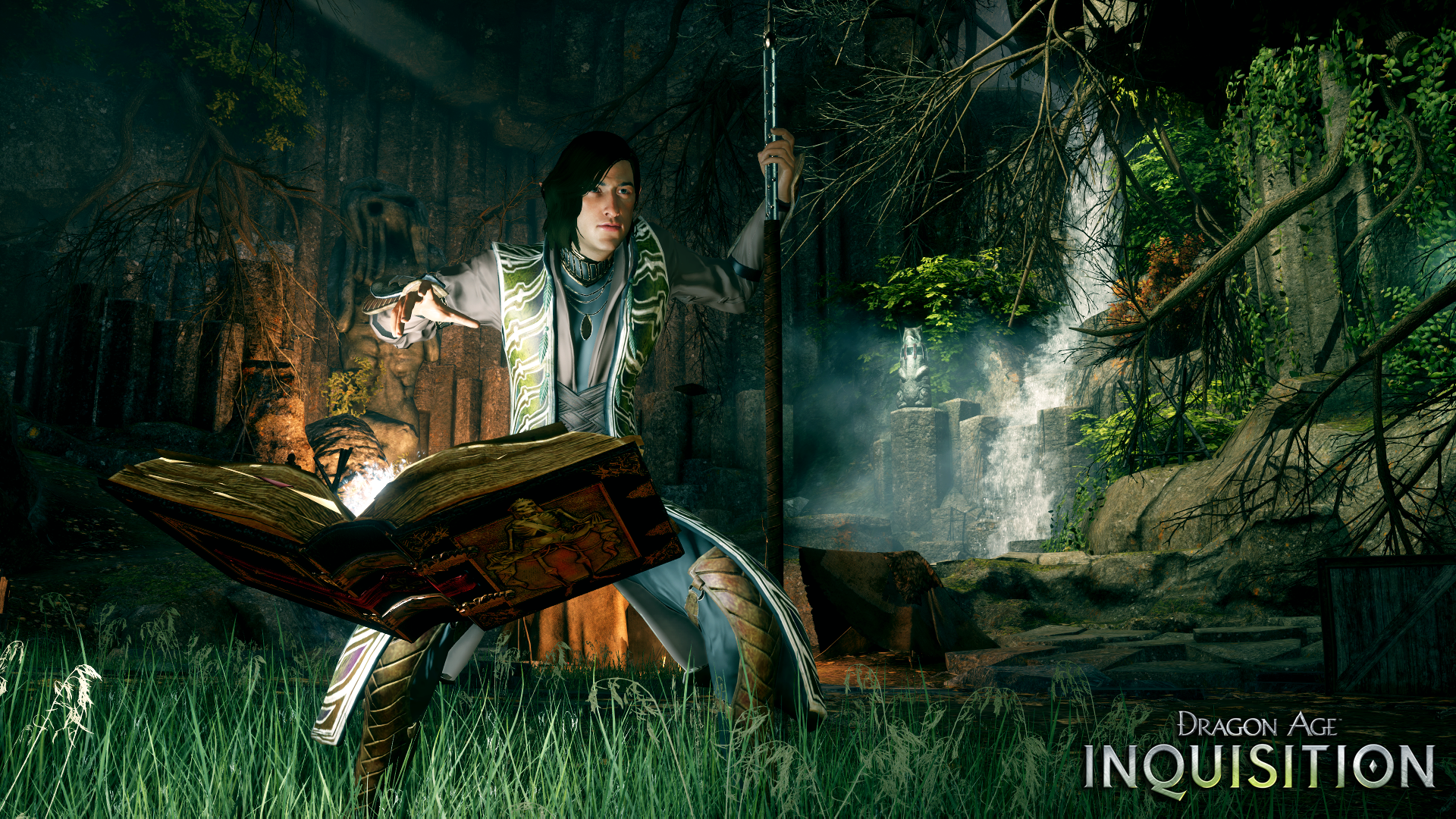
There are very few leisure activities which I wouldn’t feel confident assessing the quality of after five hours spent doing them. (For instance, it took me considerably less time to realise I was not going to be an enthusiastic fan of Austrian ice river running.) But when it comes to evaluating a new RPG—and in this instance what’s likely to be the year’s biggest—five hours is only about enough time to take you over the horizon of unfamiliarity and into feeling comfortable with most of the key systems.
So it went last week, when I played Dragon Age: Inquisition at a preview event in San Francisco. Perhaps unwisely given the time limit, I resolved to play as if I’d fired up the game on day one. That meant not rushing character creation, where I lost half an hour to iris tinting, chin tweaking and some delicate scar placement because Valeera, my Dalish elf mage, has grown up hard. (Her parents were also big Hearthstone fans.) The creation system is every bit as deep and flexible as you’d expect from Bioware in 2014, although the sheer variety of mouth shapes does still seem to cause issues with getting speech to sync naturally.
The higher echelons of the Chantry have been destroyed by the magical equivalent of a car bomb.
By the time I was done, everyone else was already into the game proper, and glancing at one of the other screens I experienced a slight twang of regret at not creating a Qunari, if only to have experimented with all the horn options. But with an enormous green rift torn in the sky like a burning Nvidia logo, plus a number of smaller breaches through which demons are spewing, and the higher echelons of the Chantry (Dragon Age’s theologian ruling class) destroyed by the magical equivalent of a car bomb, there’s no time to re-roll. Valeera was the chosen one and her life was about to become quite a bit harder.

Primarily because her hand was glowing with the same fizzing green power, which it’s soon deduced is the only way to shut the smaller breaches and possibly the main rift. For her detractors, the mark only confirms that she must somehow be to blame for, well, everything. So there’s your set-up: A kingdom under sudden demonic threat. The reluctant heroine who might be some sort of saviour figure. And, inevitably, a slowly accumulated ragtag band of followers with a conveniently diverse and synergistic set of abilities, alongside whom you’ll carry the day or die trying. So far so RPG, and certainly so Bioware.
But if the set-up is a shopping list of genre tropes, then the hope is that extended play reveals the depth of storytelling, and the nuance of character, which is the developer’s speciality. Certainly no-one does supporting casts much better than Bioware. Of the four party members I met, Varric the Dwarven Rogue returns from Dragon Age II, and provides the most interesting colour, mixing cheeky humour with weary pragmatism. “I’ve written enough tragedies to know where this is going,” he notes.
The main source of exposition and narrative drive early on comes from Cassandra Pentaghast, a Chantry Seeker who also appeared in the last game but not as a party member. Having led me on an an initial mission to shut the rift, the results of which can best be described as ‘a limited success’, she reforms the Inquisition in order to investigate who’s behind the demonic shenanigans. Cassandra is all business and a mostly quite grumpy, but I suspect will morph into the stoic, almost painfully-loyal type.

The early group is rounded out with Solas, a cue ball-headed Elven mage who seems a typically contemplative Spock-type, and Vivienne, who’s also a mage but is entirely more interesting. I first encounter her at a masked party being hosted by the Grand Enchanter Fiona. (Which seems an incongruously ungrand name, but is perhaps a valuable lesson that your parents can’t define you. Okay mum?) The soirée is held outside Val Royeaux, capital of Orlais, a region inhabited by French-accented aristos. I’ve barely had a chance to take a crack at the canapés before a marquis challenges Valeera to a duel. At which point in saunters Vivienne, who freezes the snarky posho and asks what I’d like to do with him.
Keep up to date with the most important stories and the best deals, as picked by the PC Gamer team.
Bioware’s smart approach to player choice and an interesting, relatable cast is even more welcome than normal.
My self-imposed rule in these moments is to always go with gut reaction rather than try to theorise which option might lead to the optimal outcome. In this case, that meant clicking: “I’ve been insulted, he must pay with his life”. And sure enough Vivienne obliges, magically choking the dude to death and then ordering some servants to take him out like a heavily-embroidered refuse sack. I like her, she can stay.

Given the upsetting noise around gaming recently, Bioware’s invariably smart approach to player choice and creating an interesting, relatable cast is even more welcome than normal. One of the things I like most about their companions—the whole PC Gamer staff picked their favourites here—is that whatever I get up to in-game, however heroic or heinous, they’re effectively saddled with me for the whole ride. (Sudden deaths notwithstanding.) The stakes involved for all are always so high that, while they might grouse a bit about the particulars of my chosen approach, ultimately they have to suck it up.
And so no-one moans when I have the marquis killed on a whim. Likewise none of them query my methodology when I begin roaming the countryside unleashing Chain Lightning on unsuspecting rams in order to harvest their leather. (Well, the first one was unsuspecting. The others caught on quick.) They don’t even complain when, having completed a clear-out-the-cave side mission with a friendly mage NPC, I then get into a row with her over who gets to keep the enchanted ring loot, which ends with quite the magical shitstorm and three deaths. Non-judgemental friends who believe in sharing are the best.
With over two decades covering videogames, Tim has been there from the beginning. In his case, that meant playing Elite in 'co-op' on a BBC Micro (one player uses the movement keys, the other shoots) until his parents finally caved and bought an Amstrad CPC 6128. These days, when not steering the good ship PC Gamer, Tim spends his time complaining that all Priest mains in Hearthstone are degenerates and raiding in Destiny 2. He's almost certainly doing one of these right now.


